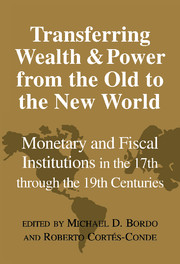 Transferring Wealth and Power from the Old to the New World
Transferring Wealth and Power from the Old to the New World Published online by Cambridge University Press: 27 March 2010
INTRODUCTION
Approach to the Currency Experience
War – and its implications for the expenditure side of the government budget – has always been associated with taxes. During most of the Portuguese monarchy, taxes included gold and other domain revenues coming from monopolies established on domestic and international trade. Together with silver and copper, gold was used as money, making its interaction with war and taxes central to the long-term pattern of economic growth and development.
The overview of Portuguese fiscal and monetary institutions from the seventeenth to the nineteenth centuries presented in this chapter is subtitled “The Inheritance of the Real” (plural réis), after the name of the national currency from 1435 until 1911. To the extent that currency experience is embedded in the overall evolution of fiscal and monetary systems, the legacy becomes a case study in institutional persistence and adjustment. In fact, the interaction of war, taxes, and gold implies a mix of fiscal, monetary, and exchange rate policies.
Beginning in the sixteenth century, increasingly expensive warfare became a source of pressure for fiscal change. Times of war were also an auspicious context for the social legitimization of direct and indirect taxation capable of supplementing or replacing domain revenues. This legitimization linked taxation to private property rights in an almost “contractual” manner via the traditional representation of nobility, clergy, and towns in the Cortes. The custom that any new tax should be discussed there reinforced the financial freedom derived from the availability of a stable and convertible currency.
To save this book to your Kindle, first ensure [email protected] is added to your Approved Personal Document E-mail List under your Personal Document Settings on the Manage Your Content and Devices page of your Amazon account. Then enter the ‘name’ part of your Kindle email address below. Find out more about saving to your Kindle.
Note you can select to save to either the @free.kindle.com or @kindle.com variations. ‘@free.kindle.com’ emails are free but can only be saved to your device when it is connected to wi-fi. ‘@kindle.com’ emails can be delivered even when you are not connected to wi-fi, but note that service fees apply.
Find out more about the Kindle Personal Document Service.
To save content items to your account, please confirm that you agree to abide by our usage policies. If this is the first time you use this feature, you will be asked to authorise Cambridge Core to connect with your account. Find out more about saving content to Dropbox.
To save content items to your account, please confirm that you agree to abide by our usage policies. If this is the first time you use this feature, you will be asked to authorise Cambridge Core to connect with your account. Find out more about saving content to Google Drive.